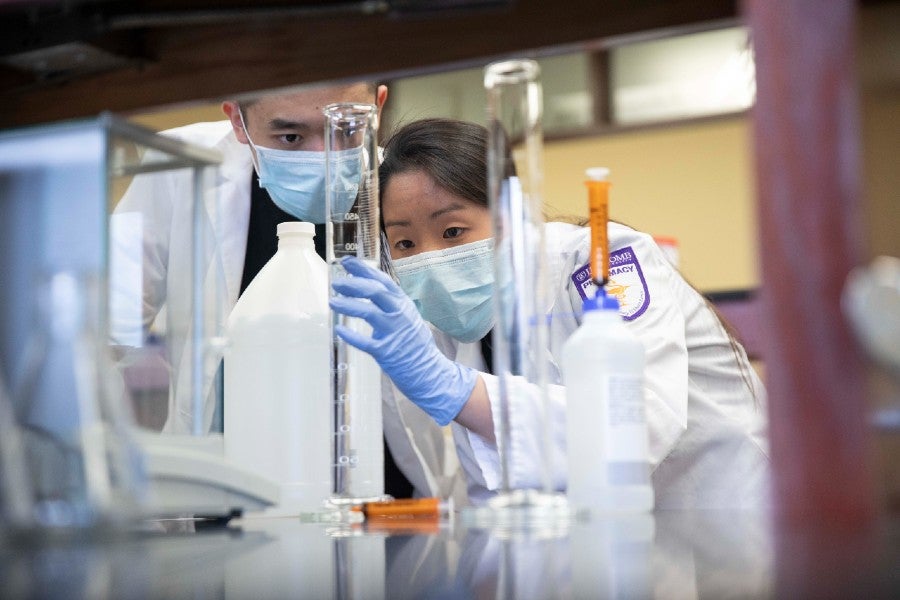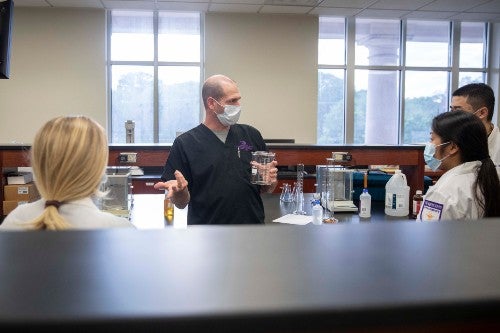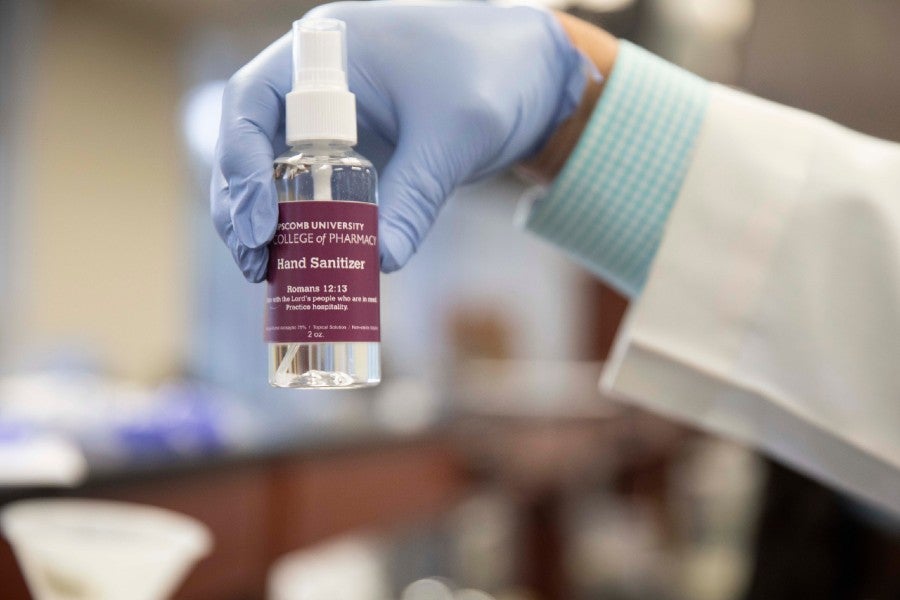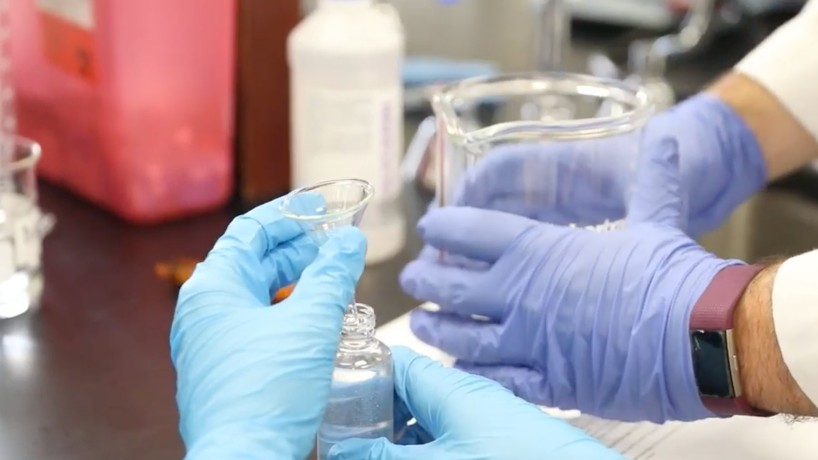College of Pharmacy compounds hand sanitizer for public safety, health care providers
The Lipscomb community continues to find ways to serve during the COVID-19 pandemic.
Kim Chaudoin |

Finding solutions to community needs and positively impacting an individual’s quality of life are often part of a pharmacist’s daily work.
Often, that is done through patient interactions focused on their care and health through their expertise in the safe and effective use of medicines and being part of health care teams alongside physicians, nurses and others.
But it is also done through the innovative use of their knowledge and expertise in unique circumstances — such as the COVID-19 pandemic — to serve others. On May 11, a small group of student pharmacists, faculty and recent graduates gathered in the College of Pharmacy Compounding Lab to put their skills to work meeting the community need for hand sanitizer. With the high demand for hand sanitizer in the wake of the COVID-19 pandemic, supplies are often depleted or what is available is often sold at a premium cost.
The group volunteered their time and knowledge to compound a supply of the hand sanitizer formula based on World Health Organization recommendations to provide for free to Nashville area healthcare providers and public safety organizations.
Since May, student, faculty and staff have compounded 2,748, 2-ounce spray bottles of hand sanitizer and provided them to various organizations including Heritage Medical and Alive Hospice. The college has provided well over 1,000 for Lipscomb's employees and departments that involve the community, such as the tennis club and the Sound Emporium studio.
“This was a very natural project for us to embark upon because it is an opportunity for our students to utilize the compounding skills that they have developed through the curriculum and apply that to a real world situation,” said Dr. Tom Campbell, dean of Lipscomb College of Pharmacy. “It also allows our student pharmacists to be part of the solution for something that is a big issue in our community and across the country.”

DR. JIMMY TORR, ASSOCIATE PROFESSOR OF PHARMACY PRACTICE, GIVES INSTRUCTION ABOUT THE HAND SANITIZER COMPOUNDING PROCESS.
“People often feel helpless in the fight against this pandemic,” he continued. “This is a chance for our student pharmacists to be a part of the solution of trying to prevent the spread of this virus.”
Campbell said this is also an opportunity to help their colleagues in the health professions.
“Whether this goes to hospice nurses or social workers or our public servants, it’s an opportunity for us to help those who are on the front lines serving and to also help better protect them as they go about doing their valuable work,” he said.
Dr. Jimmy Torr, associate professor of pharmacy practice, led the process setting up three workstations in the compounding lab and overseeing the process. The formula used in compounding includes four ingredients and creates a sanitizer mixture with an isopropyl alcohol concentration of 75 percent. According to the Centers for Disease Control and Prevention guidelines, if soap and water are not available for hand washing using hand sanitizer that contains at least 60 percent ethanol or 70 percent isopropyl alcohol alcohol is an effective alternative. They are preparing a topical solution formula and packaging them in 2 oz bottles with a customized College of Pharmacy label that includes information about the formula.
Kyle Owens, a Hendersonville, Tennessee, native who graduated with his PharmD degree from Lipscomb earlier this month, volunteered his time and talents to the effort.
“I think a project like this is a reflection of the type of school Lipscomb is to teach us to be compassionate health care providers,” said Owens, who will soon begin his residency with the Tennessee Valley Healthcare System at the VA Hospital in Nashville. “I and the two other recent graduates who are here tonight aren’t doing this because we get any kind of academic credit, but we are doing it because we know it’s just the right thing to do for those in the area who may not have access to what we can provide.”
Also on the compounding team is Christine Hunter, a second-year student pharmacist, who is originally from New York, one of the nation’s hot spots during the pandemic. She left a career as a medic in the military to attend Lipscomb’s College of Pharmacy to pursue her dream of becoming a pharmacist. Volunteering her time for the project is an outgrowth of her passion for serving others.
“I believe strongly in being involved in the community and helping however and whenever I can,” she said. “This project gives me an opportunity — no matter how big or small it may be — to do my part and to have a positive impact.”
“I was a medic because I enjoyed helping others,” Hunter continued. “Lipscomb has given me an opportunity to continue serving the community. This time affects everyone in our community and it’s nice to be a part of something that reaches everyone. It affirms to me that I’ve made the right choice in pursuing my pharmacy degree.”
For Hunter, the project also gave her an opportunity to pick up where she left off in her classroom work when the pandemic caused classes to move to a remote format. She was a student in the compounding course that was being taught in the lab when that disruption occurred. Monday night was the first time she had returned to the lab since early March.
“This gave Christine the opportunity to go back and hone some of those skills she was learning,” said Campbell.
Hunter said this experience was similar to a class assignment just weeks before the COVID-19 pandemic was declared.
“We had just had a problem related to a pandemic on one of our assignments,” she recalled. “It was nice to be able to apply what we learned through that assignment and see how it compared to the real-life situation.”
The pharmacy compounding crew will continue to compound hand sanitizer “as long as the pandemic is active around us.”
Lipscomb University is the home of Middle Tennessee’s first College of Pharmacy, founded in 2007. The mission of the Lipscomb University College of Pharmacy is to provide an educational environment characterized by academic excellence and Christian faith, where student pharmacists are prepared to advance the profession and optimize patient medication outcomes in an ethical and compassionate practice. The college is accredited by the Accreditation Council for Pharmacy Education (ACPE).For more information, visit www.lipscomb.edu/pharmacy.

— Photos, video by Kristi Jones
